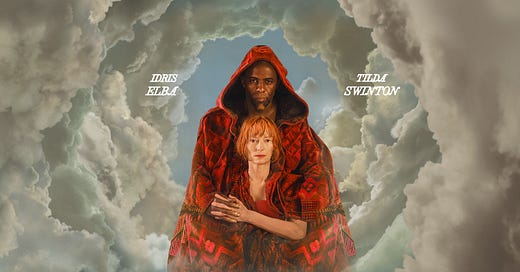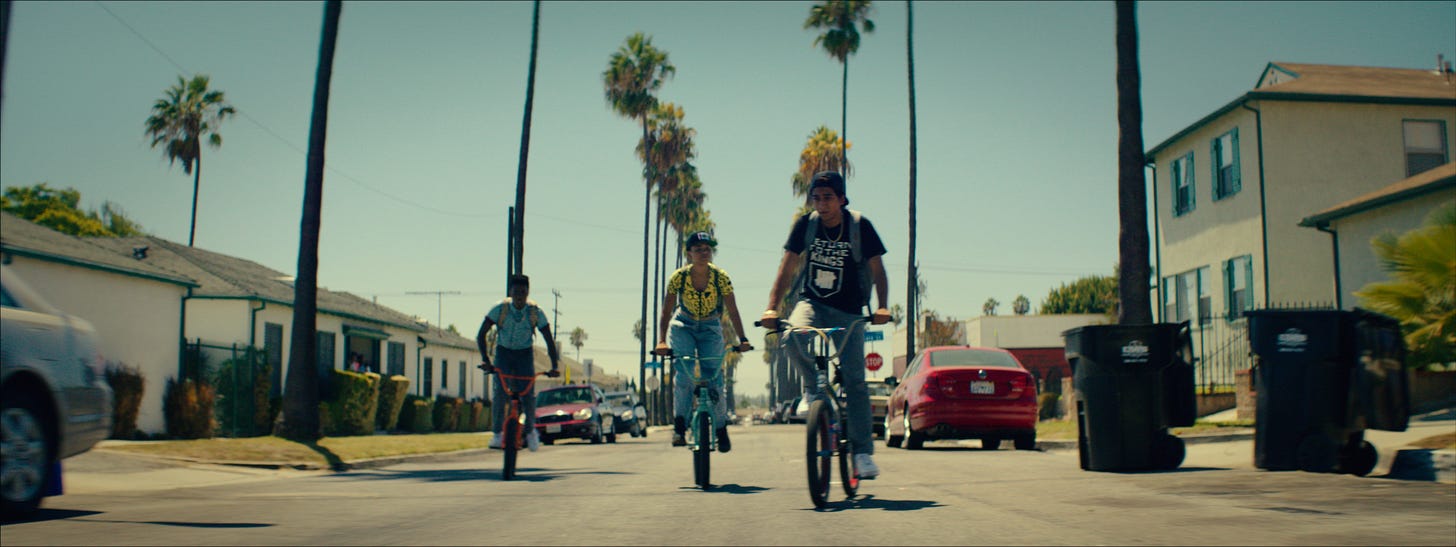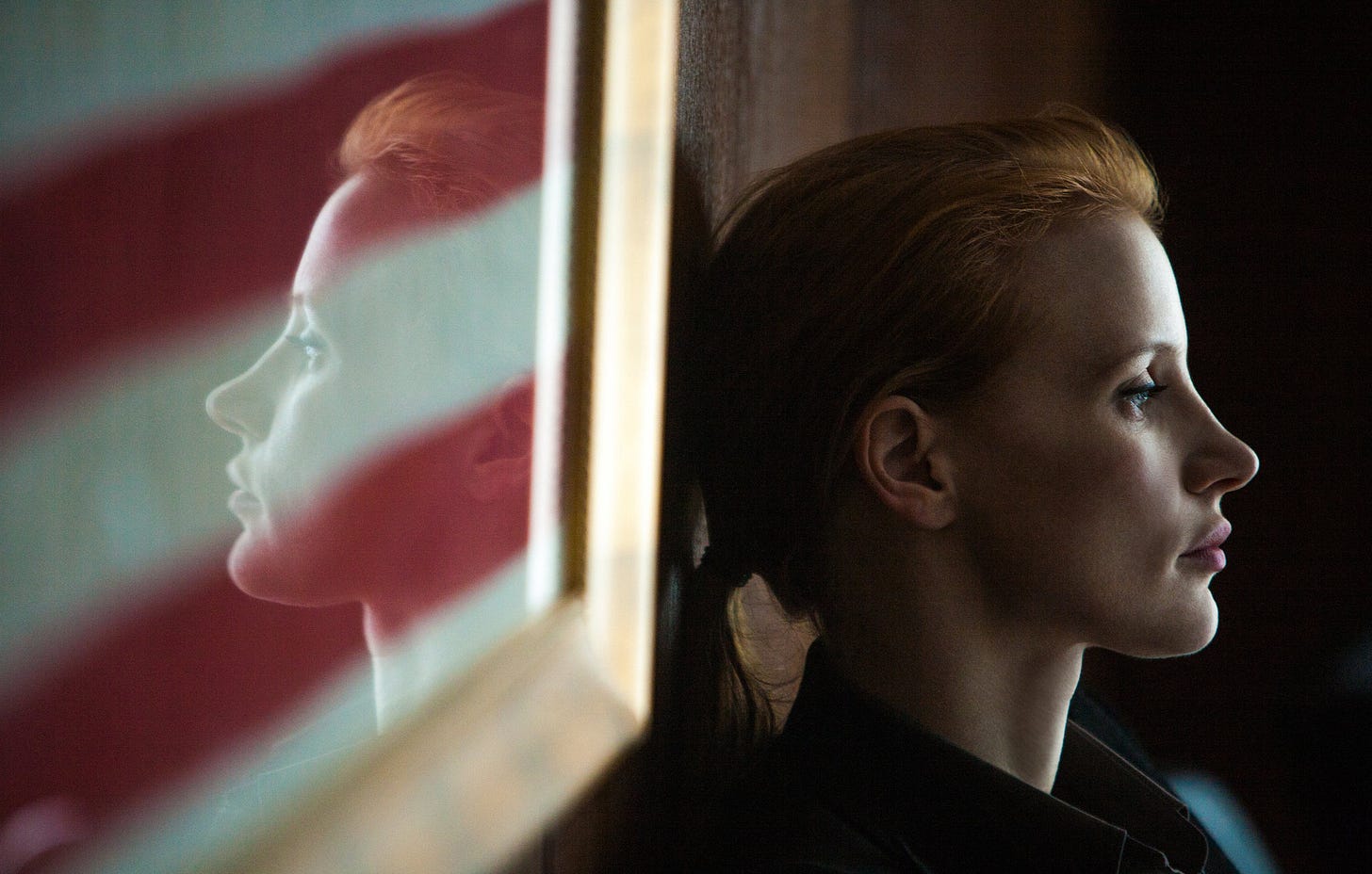Big-Budget Passes and Low-Budget Saves, Weekly Reel #29
Besides from the pick of the week, the saves and passes nicely fall along the lines of Hollywood oscarbait and indie high school, coming of age dramas
News of the Week: August is a low-output theatrical month, which will be more than made up for in the following months as major film festivals premiere the “best” films of the year. Also, MoviePass is back! If it’s available for the LA region, then I’ll happily be their Guinea pig and report back.
Watch Now
Three Thousand Years of Longing (2022, George Miller, USA/Australia) wouldn’t normally be my pick of the week. But since its in theaters and the effects and set design require that big-screen touch—not to mention a thank you for going from George Miller before the opening credits—it deserves a ‘watch now’ spot. It’s about a lone-wolf narratologist, played by Tilda Swinton, who’s visiting Istanbul to give a co-presentation on the historical significance of storytelling. At the Grand Bazaar later, she buys a small azure-striped glass bottle that launches a fire and smoke Djinn (Idris Elba). He gives her three wishes, but she’s skeptical because she knows how these cautionary fables end, so he tells her several stories about how he ended up there to sooth her skepticism. One involves the Queen of Sheba and King Solomon and the rest are set in Istanbul; one with Prince Mustafa and his father Suleiman, then with brothers Murad IV and Ibrahim, and finally with a rich merchant’s concubine. Each of the stories play a significant role in Djinn’s life, which weave into the main conversation between Djinn and Swinton in her Istanbul hotel room.
The story feels like an adaptation of a short story, which it is. Based on "The Djinn in the Nightingale's Eye," a 1994 short story by A. S. Byatt published in The Paris Review, Three Thousand covers a slightly narrower range of epic tales compared to its source, which goes into stories from One Thousand and One Nights, Chaucer, Shakespeare, the Epic of Gilgamesh, and the myth of Cybele. It’s like George Miller’s been reading a lot of Joseph Campbell on the sets of his Mad Max films, finally getting the chance to fictionalize the storytelling process itself thanks to his post-Fury Road, blank-check career and short story from Byatt. The height of the story is in this commentary on what storytelling means in our current hyper-tech era, where all magic has a scientific answer. A good chunk of the exposition is Swinton and Djinn making the case for the relevancy of Djinn’s utility in granting wishes at all. Swinton at first doesn’t require him, but as the story progresses, his stories of longing for three millennia makes her re-think her own post-divorce, post-miscarriage solitary existence.
Where the film works the least for me is in the romantic plot, which is present in the historic tales that Djinn tells but takes too long and without enough motivation in the present-day story to be fully effective. Which is interesting because Miller evaluates the thesis of the film—storytelling as a soothing device to give words and images to the unknown yet parallel forces of mankind across spacetime—against itself. In other words, the romantic plot, which should be the engrossing story to sustain our interest, isn’t as engrossing as the meta-narratology commentary. That it’s more interesting to watch someone talk about stories than it is to watch the stories. That’s deliberate, of course. But it comes too much at the expense of the present-day story. Maybe you’d think otherwise? You can catch Three Thousand Years of Longing at a theater near you—in Dolby if you can manage.
Save for Later
Dope (2015, Rick Famuyiwa, USA) is a coming of age dramedy about Malcolm Adekanbi (Shameik Moore), a nerdy high schooler into nineties fashion and hip hop, who’s living in Inglewood’s “The Bottoms,” a high-crime neighborhood in LA. Malcolm successfully stays away from the crime and drugs through his schoolwork and hobbies until having a run-in with the local drug dealer, Dom (ASAP Rocky, one of the many rappers in a supporting cast that could flesh out the features of an EP). At a party that’s raided, Malcolm takes Dom’s coke bag, which sends the plot-ball rolling downhill. And of course, there’s a young lady, Nakia (Zoë Kravitz), who stands between Malcolm and Dom.
Rick Famuyiwa, the writer/director, grew up in Inglewood and has expressed interest in reviving its public image, often filled with violence and ghetto depictions. Famuyiwa does this through trivializing those depictions, rather than turning them into the all-embracing vice grips of victimization. He doesn’t allow for the easy binaries, instead opting for racial diversity and acceptance of oneself and others around you. Malcolm represents the nuance between depictions, which he must reconcile before writing his important entrance essay for Harvard’s application. It’s a fun film but not a great film. It has some scenes and characters it could do without, but the main characters and plot are interesting enough to keep it going. For now, you can find Dope on Netflix.
Hala (2019, Minhal Baig, USA) is another coming of age story about Hala (Geraldine Viswanathan), a seventeen-year-old Pakistani American Muslim girl trying to make her way through senior year at high school. Her family values, religious and cultural—her parents had an arranged marriage in Pakistan, don’t mix easily with quiet, middle-class American suburbia, which causes Hala to pause in her development into adulthood. Her father (Azad Khan) is a successful law partner who travels often and bonds with Hala through New York Times’ crossword puzzles, but her mother (Purbi Joshi) is a reserved housewife that fails to easily bridge the gap between her past and present. Because of that, she and Hala speak past one another in every conversation—Hala speaks English, her mother replies in Urdu, and vice versa. Hala wears a hijab and prays, but not always, and skates and excels in English class. As you can guess, these two worlds conflict with one another until the climax reveals a butting of two equally stubborn heads.
Although the plot is conventional, a high-schooler-coming-of-age dramedy, the inclusion of the multi-generational ethno-religious dimension provides a nice confrontation seldom seen in this genre—imagine if Booksmart met The Big Sick at a bar. But it takes time for that uniqueness to bleed through. Acts one and two deliver the conventional genre tropes but the director/writer Minhal Baig gives us the juice in act three in as surprising a twist as the genre can allow. Unfortunately, like so many films today, the character arc was larger for one of the supporting characters instead of Hala, which frustrates the ending of an otherwise decently plotted story. Baig, who said the film is not auto biographical but certainly has similar elements to her upbringing, premiered the film at Sundance in 2019. Apple TV+ bought its distribution rights on the spot, which is where you can stream the film.
Pass
House of Gucci (2021, Ridley Scott, USA) is exactly what I expected it was going to be—a bunch of Americans with plastic aesthetics and fake Italian accents. Universal completely botched its release, coming out a month after Ridley Scott’s other epic period piece, The Last Duel—also with Adam Driver. House of Gucci has all the worst trappings of oscarbait schlock: November release, historic bio-pic, Lady Gaga, Jared Leto doing a Jared Leto performance, and a pop soundtrack to make it seem more relevant than it is. In our current era of shows and films about epic family successions, Gucci punches well below its weight given its source material, cast, and director. What else? I’m glad Gaga didn’t get the Oscar nomination, Leto was less bad than in his previous “performances,” Leto and Pacino’s characters are quite important but barely step into the third act and die off screen, Jeremy Irons is a monster in any film he’s placed in, and Salma Hayek is completely forgettable. That’s all.
Zero Dark Thirty (2012, Kathryn Bigelow, USA) was one of the most effective uses of the CIA fictionalizing the unofficial “official” story about the illegal killing of Osama bin Laden. They pulled off a similar stunt with Argo the year before Zero Dark Thirty’s release—the former winning three Oscars, including best picture. But controlling the narrative of the six American hostages rescued from Tehran in 1979 would be simple compared to the killing of bin Laden, which happened only seventeen months before Zero graced theaters. Upon release, and for years afterwards, the involvement between the filmmakers (specifically with director Kathryn Bigelow and writer Mark Boal) and the CIA was denied until mid-2015. They were, in short, given enough material and inspirations to be handled/guided successfully. Critics praised the film, and it worked well in delivering audiences the juicy details of how bin Laden was found. Ten years later, the only scene holding up is that finale raid. The rest of the plot, where Maya (played by Jessica Chastain), who is a stand-in for Bigelow and her experience in a masculine industry, is scolding anybody who doesn’t believe her flaky evidence, comes across today as overtly oscarbaity and a sleep-inducer that makes the finale a welcome thrill. And by that time, one forgets about the war crimes in act one.
It almost doesn’t matter that for the last decade, and during its release, the film has been smeared as propaganda because the initial effect was achieved: they controlled the narrative and forced everyone to dispute that rather than present a researched story, which would take years. Doing so would make the CIA look worse than their recovering-from-WMDs image at the time. (Investigative journalist Seymour Hersh, who I linked above, wrote an amazing long-form piece on the events leading to and covering up of the killing of bin Laden—spoiler: the Americans don’t look so good.) One may ask, how are they controlling the narrative, even with the brutal torture scenes depicting them negatively? Simple PR damage control, release a little information on past sins already confessed (Obama declared waterboarding torture and illegal in his first term) while confining the details that will remain hidden from the public for several generations. I can normally separate films from propaganda, hidden or full Triumph of the Will, but not when it’s this contemporary—and therefore consequential today—and naked in its attempt at holding you down and stapling wool over your brow. I was skeptical after the film’s release and now even moreso a decade later.
Thank you once again for checking out my Substack. Hit the like button and use the share button to share this across social media. And don’t forget to subscribe if you haven’t already done so.








